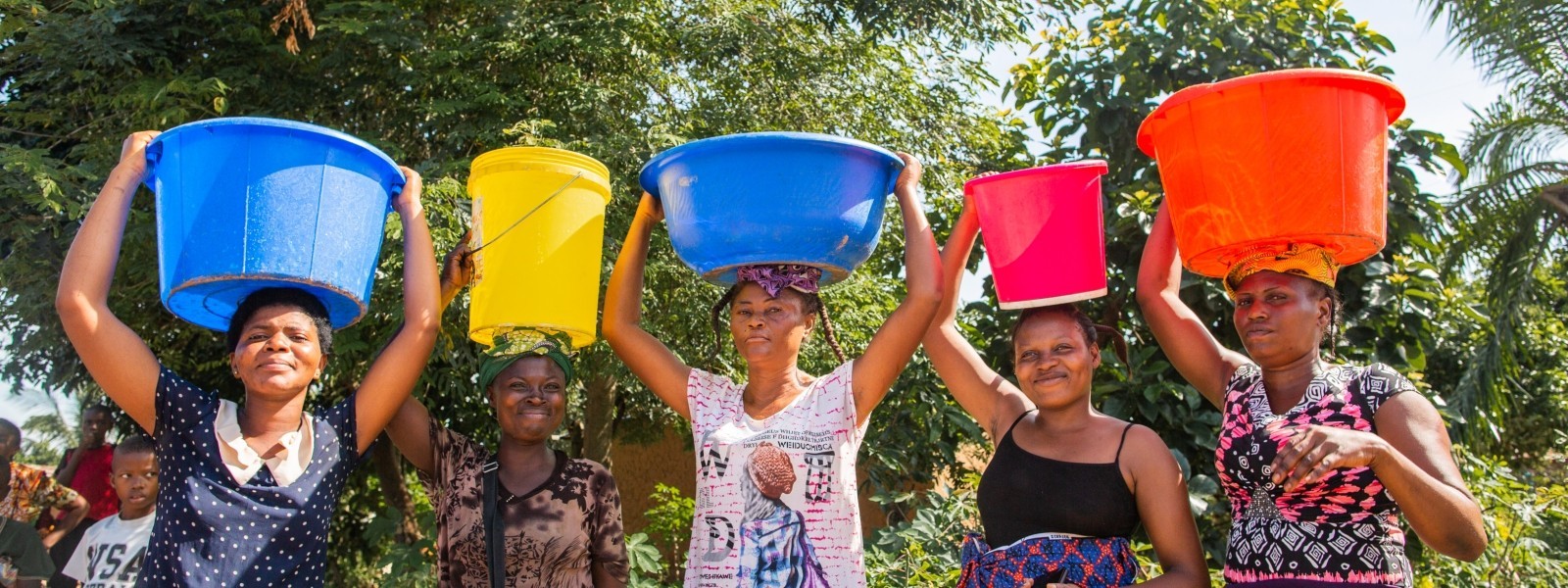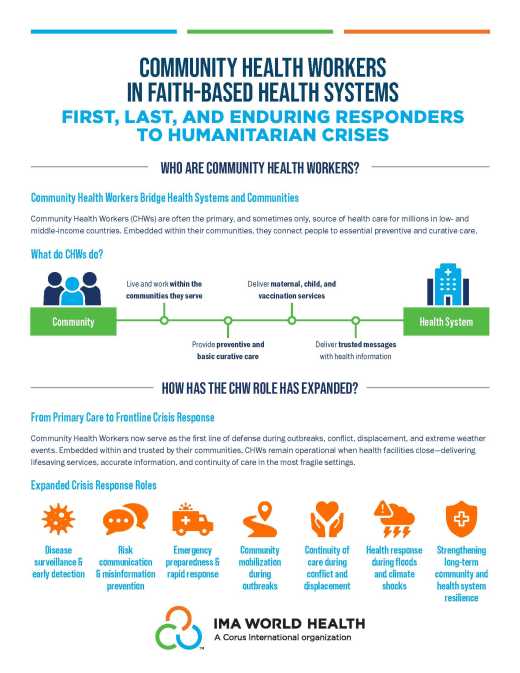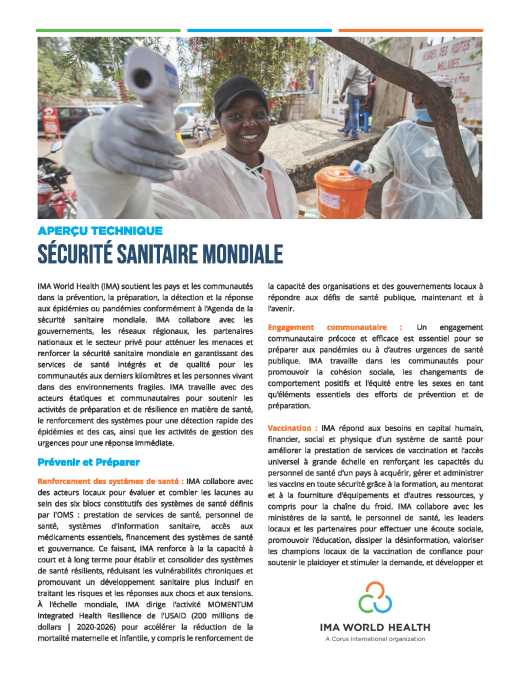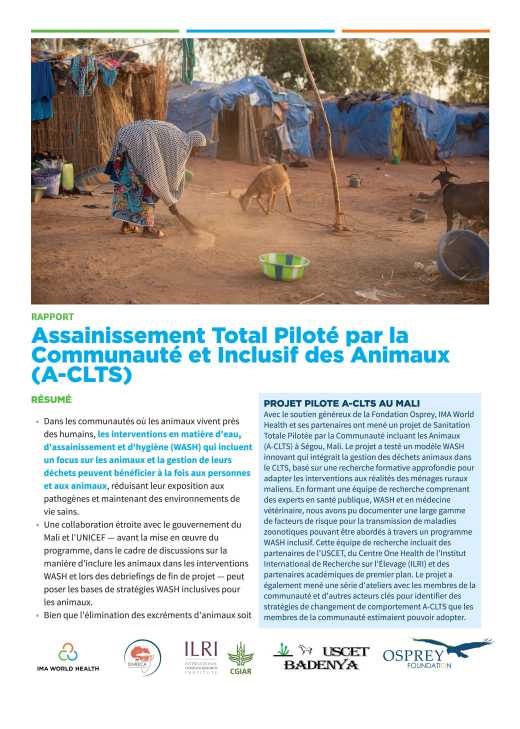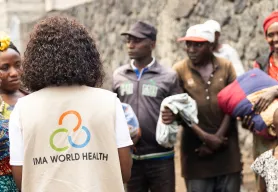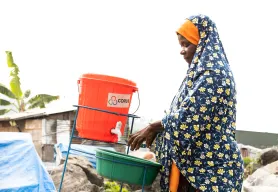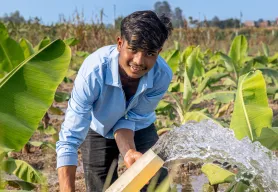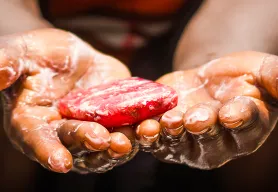Access to safe drinking water, adequate sanitation and proper hygiene practices are critical for human health and well-being. Poor WASH conditions lead to the spread of waterborne diseases, such as diarrhea and cholera, which can have devastating consequences on communities, particularly in low-income countries. With far-reaching impacts on education and economic growth, investment in WASH infrastructure is essential.
IMA World Health, alongside the Corus International family of organizations, is committed to addressing WASH around the world. Our WASH programming employs a public health approach to WASH in emergencies, as well as sustainable water resource management, animal management and community WASH mobilization for improved sanitation.
Corus brings together IMA World Health and Lutheran World Relief to integrate WASH interventions into livelihoods projects as well as into broader health systems strengthening initiatives. Our approach is multi-sectoral and works to combine the resources and capacities of WASH and health sector authorities with the private sector to plan, finance and deliver integrated WASH outcomes through markets.
IMA World Health also emphasizes education and effective behavior change strategies to promote good hygiene practices. We believe in strengthening the capacity of local communities and governments to sustain WASH improvements over the long-term. We increase access to WASH facilities, helping local leadership develop business plans and financial projections, design low-cost WASH facilities, implement community education programs and craft local ordinances to support these activities. Our Corus partner organization Lutheran World Relief also promotes water conservation and effective watershed management to create healthier landscapes that are more resistant to droughts and floods.
Access to clean water is a critical need in the wake of a humanitarian crisis. We deliver supplies of water in emergencies to affected areas, while also installing or rehabilitating storage tanks and reservoirs. Where water is scarce or unsafe, we drill and decontaminate wells, install hand-pumps, protect natural springs, tap aquifers, rehabilitate damaged infrastructure, and pipe water into hard-to-reach communities and health centers.
By engaging with government, private sector, health and community leaders, we seek to accelerate change to bring WASH access to all.
In Practice
Renewed clashes in the Democratic Republic of the Congo (DRC) have forced hundreds of thousands of people out of their homes, worsening the already dire humanitarian crisis in the North Kivu province. In response to critical WASH needs and to support cholera response efforts in areas of displacement, IMA World Health partners with fellow humanitarian actors to provide critical hygiene and sanitation inputs such as hand washing stations, latrines, showers, brooms and waste collection baskets across internally displaced person (IDP) sites. By increasing access to WASH for IDPs and host households in the Nyiragongo health zone, IMA World Health is committed to reducing mortality and morbidity rates from waterborne diseases. To date, 31,931 individuals across 16 IDP sites have been provided with hygiene kits and handwashing stations.
IMA World Health recognizes the need for WASH programming to further emphasize livestock management and animal waste given insufficient separation of animal waste from human domestic environments, common in low-income countries, can lead to fecal-oral transmission of zoonotic pathogens. In conjunction with a consortium of research institutes and universities, including the International Livestock Research Institute, UC Berkeley and Johns Hopkins, and with funding from the Osprey Foundation, IMA World Health conducted research to better understand how animal management and environmental practices (poor composting, inadequate cooping, unhygienic slaughtering, etc.) affect child health in Mali’s Ségou region. Results from this year-long quantitative and qualitative study informed the development of modules on the management of animals and their waste. These modules will be included in the Malian government’s national WASH strategy using Community-Led Total Sanitation (CLTS).
Through the Improving Health and Nutrition in Guatemala’s Western Highlands project and its follow-on activities, our Corus partner organization Lutheran World Relief, in partnership with FundaSistemas, has employed an innovative approach—Arts-based Community Development (ABCD) —to improve health and household sanitation in Guatemala. Among several components, the ABCD approach includes partnership with local artists to develop skits that advance public health messaging as well as video presentations about household sanitation followed by community discussion. Results from monitoring and evaluation suggest improved WASH knowledge and practices, including 99% of households now employing proper latrine or toilet hygiene practices around human waste management.
The humanitarian crisis in Yemen is among the worst in the world with 1 in 8 individuals (an estimated 4.3 million people) internally displaced. Access to water and adequate sanitation services for Yemeni families is critical. Our Corus partner organization Lutheran World Relief works with the Field Medical Foundation (FMF) to implement the Provision of Life-Saving Emergency WASH Support for IDPs project in Yemen’s Marib Governate. To ensure dignified living conditions, the project provides conflict-affected populations with urgent WASH support through emergency water supplies, installation of water points, mass hygiene promotion and hygiene kit distribution. To date, 1,417,500 liters of clean water have been provided.
In Nairobi City County (NCC), Kenya, inadequate water and sanitation are among the biggest threats to child survival. Led by IMA World Health, the US government-funded Afja Jijini project improved WASH capacity by working with government and health authorities to adapt a health system strengthening approach to WASH outcomes. The project strengthened county-level institutional capacity to manage health services and advance quality WASH as a core approach to reducing child mortality. Afya Jijini introduced urban community-led total sanitation (UCLTS) as a transformative approach to behavior change around sanitation in NCC, leading to reductions in cholera disease outbreaks and increased social cohesion. IMA World Health also supported the revitalization of the county WASH Coordination Forum as a critical platform for WASH management and organization, as well as technical working groups which were instrumental in advocating for and drafting the first-ever county-level environment and sanitation bill.
During eleven years of implementation, ASSP and its follow-on projects ASSR and SEMI improved the health of women, adolescents and children through support for disease prevention, WASH, delivery of health care and health systems strengthening. With funding from FCDO, IMA World Health led the projects that supported an estimated 9.7 million people across 52 health zones in five provinces of the DRC. IMA World Health aligned with the National Framework of Clean Schools and Villages Program (CSVP) in a community-driven approach to advance better sustainable hygiene and sanitation practices while increasing access to safe drinking water. Through ASSP alone, 327,454 people were provided with access to safe drinking water sources and 304,975 people to improved sanitation.


